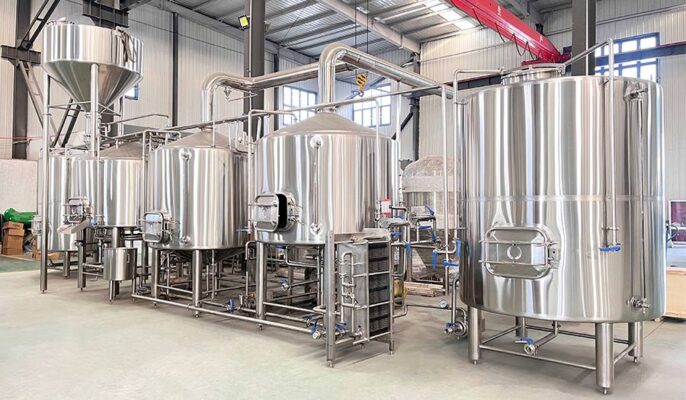The market for automated brewing systems is vast, offering a variety of options for amateur brewers and experienced brewers alike. In recent years, there has been growing interest in automated brewing systems for beer and other alcoholic beverages. These systems can provide a variety of benefits, including increased efficiency and consistency.
Automated commercial brewing system
The 2000L Automatic Brewing Commercial System is an all-in-one device that simplifies the beer brewing process. These systems combine the functions of many traditional brewing vessels into a single unit, often made from durable and easy-to-clean stainless steel. Automated brewing systems are advanced tools used by breweries to streamline the beer brewing process. Leveraging modern technology, these systems can automate many aspects of brewing, such as temperature regulation, stirring, and timing, that before required constant attention and manual intervention.

2000L Brewery Equipment Specifications
- Effective volume: 2000L; Total volume: 2500L
- Material: Edelstahl SUS304/SUS316
- Steuerungssystem: PLC Siemens oder PID Marke Schneider/ABB
- Heizmethode: Elektro-/Dampf-/Direktheizung
- Power: 92kW
- Spannung: dreiphasig/380(220, 415,480...)v/50(60)Hz; einphasig/220(110, 240...)v/50(60)Hz
- Häufigkeit des Aufbrühens: 1–2 Mal pro Tag
- Wärmeübertragungseffizienz: ≥90%
- Poliergenauigkeit: ≤4μm
- Heat exchange area: 3.5㎡
- Area required: 200 square meters
Note: 1 hl = 100 liters; 1 gallon = 3.7854 liters; 1 barrel (BBL) = 117 liters
Types of Commercial Automated Brewing Systems
- Pilot systems: These are small systems, often used for experimental brewing or by startups looking to test their recipes before scaling up. They have a capacity of 50L to 200L.
- Microbrewery systems: Ideal for craft breweries and local pubs, these systems can produce batches of beer from 200L to 1000L. They often have semi-automated capabilities and are cost-effective for small businesses.
- Large-scale brewing systems: These are giant breweries, large breweries suitable for mass production. With capacities over 5000L, these systems feature a range of advanced features to ensure consistency in large batches.
- Specialty brewing systems: These systems are designed for a specific type of beer (such as a stout, IPA, or lager) and feature specialized equipment that enhances the flavor and character of the specific beer type.
Choosing the right type of system is crucial. Factors such as your target market, production scale, and the type of beer you plan to produce will all influence your choice. It’s also a wise decision to consider future expansion when considering capacity.
2000L automated brewing system configuration
Malzmahlgerät
- Partikelverstellbarer Walzenbrecher
- Flexible or steel augers can lift ground grains directly into the mash tun
2000L Brewery Unit
- Mash/filtration barrel, boiling/whirlpool barrel 2 container combination
- Spezielle Kombination aus optionalem Warmwasserspeicher und Kaltwasserspeicher
- The brewing method of infusion or decoction is carefully designed
- Edelstahl ist wegen seiner einfachen Wartung und Reinigung beliebt, mit optionalen Kupferverkleidungen
- Zweistufiger oder einstufiger Wärmetauscher zur Kühlung der Würze
- Integrierte Arbeitsplattform komplett aus Edelstahl
- Hygienische und effiziente Würzepumpe
- Alle Rohre und Formstücke
2000l Gärtank system
- Konischer Standard-Gärtank aus Edelstahl
- Small breweries typically use single or double size breweries
- The number of tanks is accurately calculated based on the fermentation cycle of various beers
- Beinhaltet alle Löcher, Ventile, Manometer, Zubehör usw.
Fresh beer can device
- Konischer Standard-Gärtank aus Edelstahl
- Kleine Brauereien nutzen Einzel- oder Doppelbrauereien
- Die Anzahl der Tanks wird anhand des Gärzyklus verschiedener Biere berechnet
- Beinhaltet alle Löcher, Ventile, Manometer, Zubehör usw.
Kühlgerät
- Isolierte Glykolwassertanks mit oder ohne Kupferschlangen zur Aufnahme und Mischung von Glykolflüssigkeiten
- Hocheffiziente Kühlanlagen oder Kühlschränke, die Freon zur Kühlung verwenden
- Sanitärkreiselpumpe für die Glykolwasserzirkulation zwischen Tank und Wärmetauscher
- Includes all pipes, fittings, insulation materials
Kontrolleinheit
- Elektrischer Schaltschrank zur Temperatur- und Schaltersteuerung im Brauraum
- Elektrischer Schaltschrank mit Schaltersteuerung für Temperatur- und Kühlkomponenten
- Einschließlich Temperaturregler, Thermoelement, Magnetventil usw.
- SPS mit Touchscreen-Panel für spezielle Anforderungen
Vertrieb von Bier
- Barrel filling and rinsing machine
- Semi-automatic bottling machine with functions of rinsing, filling, capping, labeling, etc.
Characteristics of Commercial Automated Brewing
- Automated control: The core of the automated brewing system is its digital control panel. This interface allows you to program and watch the entire brewing process, including steeping grains (mashing), boiling wort, and controlling fermentation temperature. Some systems even offer smartphone connectivity, allowing you to control and watch your brew .
- Integrated heating element: The automatic brewing system eliminates the need for a separate kettle and heat source. They feature built-in heating elements that raise the water to the precise temperature required for each brewing stage.
- Pumps and filtration: Many systems are equipped with pumps to circulate the wort during the mashing process and transfer between stages. Additionally, some systems include built-in filters to separate the wort from the spent grains after mashing.
- Cleaning System: The automatic cleaning cycle is a popular feature on many systems, simplifying the often daunting post-brew cleaning process.
Advantages of Commercial Automated Brewing Systems
- Consistency: the most important advantage, automated brewing systems provide unparalleled consistency. Whether brewing the same type of beer every day or replicating a seasonal beer months later, this system ensures each batch meets the required parameters, delivering a reliable product to consumers every time.
- Efficiency: Automation speeds up the brewing process. These systems simplify operation with precise control of temperature, time, and mixture. The result is faster turnaround times, which means the brewery can produce more batches in the same time frame.
- Resource Management: Automated systems are designed to optimize resource use. This ensures that raw material waste is minimized, resulting in significant cost savings.
- Reduced labor: Automation reduces manual intervention. While there are some aspects of brewing where manual labor is irreplaceable, many repetitive and labor-intensive tasks can be automated. This not only reduces labor costs but also minimizes human error.
- Scalability: As a brewery grows, its needs will change. Automated brewing systems are designed with scalability in mind. Whether increasing production capacity or integrating new features, these systems can grow with the needs of the brewery.




